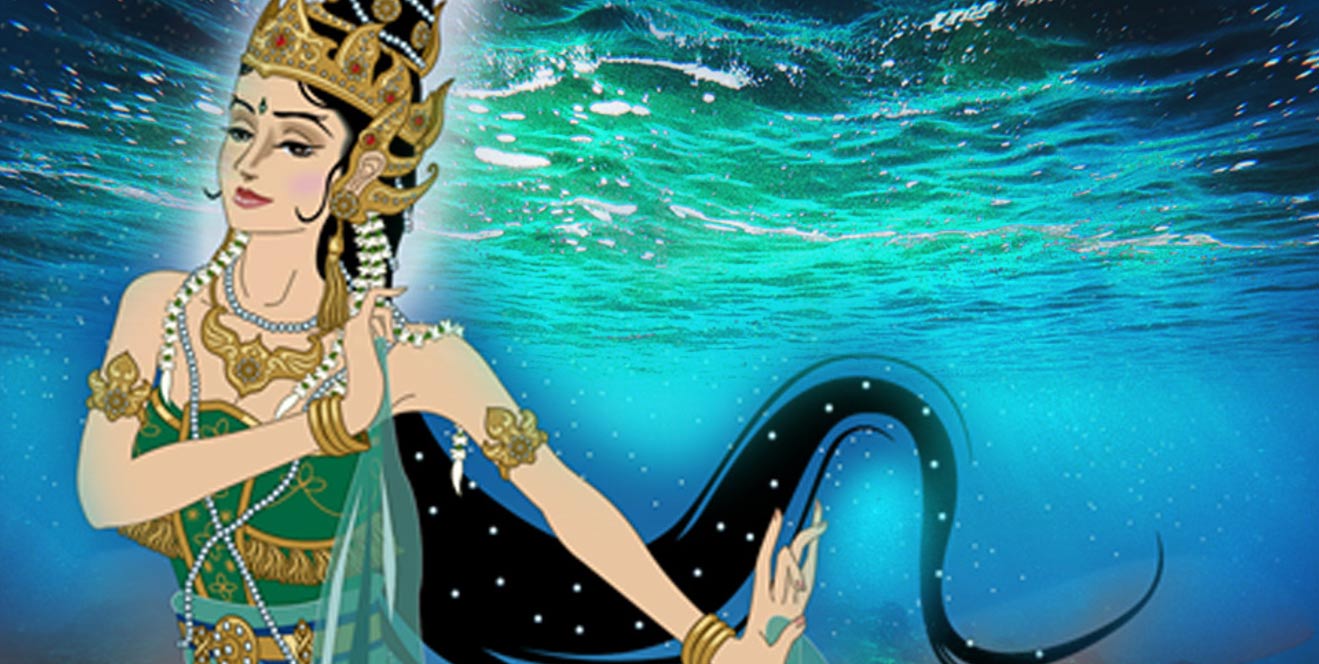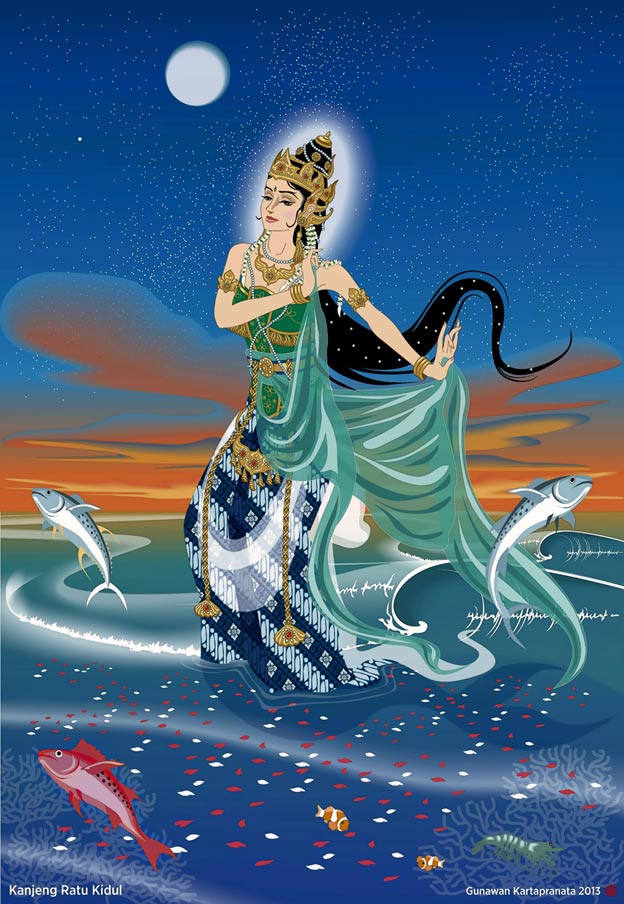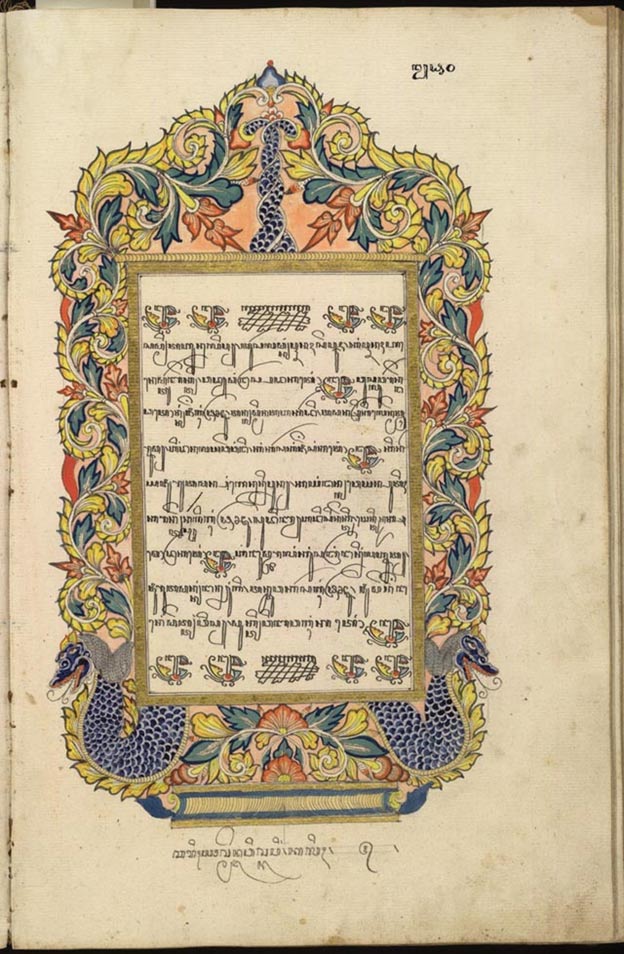
The Dangerous and Powerful Guardian Spirit Queen of the South Seas, Kanjeng Ratu Kidul
Kanjeng Ratu Kidul is a well-known figure in Javanese mythology who is still venerated by the Javanese today as the spirit queen of the Indian Ocean. Living in her palace on the bottom of the ocean off the south coast of Central Java, she rules the ocean, the spirits, nymphs, and other beings from the underworld. Her rare excursions ashore are believed to be accompanied by the occurrence of unusual natural phenomena, such as spring tides. As queen of the Southern Ocean, Kanjeng Ratu Kidul (or Nyai Loro Kidul) is held responsible for disappearances and deaths near or in the ocean. Therefore, like burial grounds, the ocean is also regarded as a dwelling place for the spirits of the dead, especially of people who die unnatural deaths by drowning.

Kanjeng Ratu Kidul, the Queen of the Southern Sea of Java. (CC BY-SA 3.0)
Kanjeng Ratu Kidul is the most prominent of the four guardian spirits of the cardinal directions in Java who receive special veneration even in modern day Surakarta. The four spirits are Kanjeng Ratu Kidul herself who guards the south, Sunan Lawu, the ruler of the spirits on Mt Lawu on the east, Kanjeng Ratu Sekarkedaton, tutelary spirit of Gunung Merapi on the west and Sang Hyang Pramoni, resident of the northern forest Krendawahana.
Although these days the name “Kanjeng Ratu Kidul” (literally means “My Lady Queen of the South”) is the most commonly used, she is also affectionately known as Nyai Roro Kidul. The use of the word “Kanjeng” and “Nyai” in addressing the spirit queen and other Hindu-Buddhist Javanese spirits derived from the traditional habit of the Javanese of considering their relationship with their Hindu-Buddhist gods, deities and ancestral spirits as a relationship to senior but intimate kin. Therefore, they consistently use the kinship terms for their deities and spirits, such as Hyang (exalted ancestor), Eyang (honored grandfather or grandmother), Kiyai (master), or Nyai (madam or mistress), as well as the honorifics for kings or high officials, such as Gusti (Your Highness), Kanjeng (My Lord or My Lady), or Sunan (Your Grace).
The Struggles and Transformation of Kajeng Ratu Kidul
Kanjeng Ratu Kidul is said to have been named Ratna Suwida, the daughter of a ruler of the West Javanese kingdom of Pajajaran although the accounts differ as to who her father was. There are various reasons for her transformation from a princess of the court into the guardian spirit of the Southern Ocean.
- The magnificent ancient Buddhist Temple of Borobudur
- On the Verge of a Major Discovery – Pyramid Structure in Java May be More than 9,000-years-old
- Archaeologists unearth remnants of ancient Sailendra dynasty in Java
The most common explanation is that she was a beautiful young woman who contracted a skin disease due to black magic invoked by a jealous step-mother, forcing her to leave the palace and seek refuge in the forest where she then meditated until she gained special supernatural powers. Other stories say that she declined to marry, refusing one suitor after the next, until finally angering her father who then banished her from the palace, causing her to enter the forest. Still other versions combine elements from these stories and have her contract leprosy on the eve of her marriage, leading her to run away to the forest in disgrace. After meditating in the forest for a long time, she gained great powers and became able to perform miracles such as shape-shifting to cover her skin disease, even turning herself into a man when necessary.

Wadana or frontispiece of Babad Tanah Jawi (History of the Javanese Land) copy from the 19th century. (Public Domain)
According to the nineteenth century chronicle Babad Tanah Jawi (Chronicles of the Land of Java), the orphaned prince of Pajajaran, Raden Joko Suruh, heard a voice of a hermit which ordered him to found a kingdom in East Java. As the hermit stepped into view, Joko Suruh discovered that the hermit was in fact a beautiful young woman, and he fell in love with her. She rejected him, because she was really his kinswoman Ratna Suwida, who was banished long ago and had lived in the forest to meditate ever since. She told him that she would soon leave the forest to the southern coast to take her place as the ruler of the spirit-world and when the descendants of the Gunung Merapi (literally translated as “the Mountain of Fire”) founded a kingdom, she would marry the successive rulers. According to the Kudadu Stele in 1294 CE, Joko Suruh indeed went on to found the kingdom of Majapahit and renamed himself Raden Wijaya.




